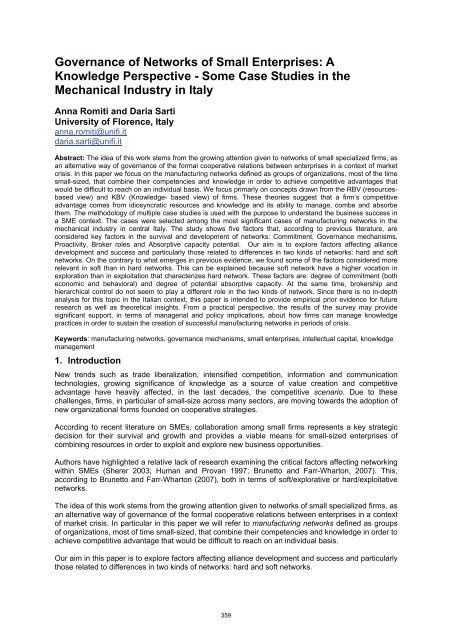Proceedings of the 3rd European Conference on Intellectual Capital
Proceedings of the 3rd European Conference on Intellectual Capital
Proceedings of the 3rd European Conference on Intellectual Capital
Create successful ePaper yourself
Turn your PDF publications into a flip-book with our unique Google optimized e-Paper software.
Governance <str<strong>on</strong>g>of</str<strong>on</strong>g> Networks <str<strong>on</strong>g>of</str<strong>on</strong>g> Small Enterprises: A<br />
Knowledge Perspective - Some Case Studies in <str<strong>on</strong>g>the</str<strong>on</strong>g><br />
Mechanical Industry in Italy<br />
Anna Romiti and Daria Sarti<br />
University <str<strong>on</strong>g>of</str<strong>on</strong>g> Florence, Italy<br />
anna.romiti@unifi.it<br />
daria.sarti@unifi.it<br />
Abstract: The idea <str<strong>on</strong>g>of</str<strong>on</strong>g> this work stems from <str<strong>on</strong>g>the</str<strong>on</strong>g> growing attenti<strong>on</strong> given to networks <str<strong>on</strong>g>of</str<strong>on</strong>g> small specialized firms, as<br />
an alternative way <str<strong>on</strong>g>of</str<strong>on</strong>g> governance <str<strong>on</strong>g>of</str<strong>on</strong>g> <str<strong>on</strong>g>the</str<strong>on</strong>g> formal cooperative relati<strong>on</strong>s between enterprises in a c<strong>on</strong>text <str<strong>on</strong>g>of</str<strong>on</strong>g> market<br />
crisis. In this paper we focus <strong>on</strong> <str<strong>on</strong>g>the</str<strong>on</strong>g> manufacturing networks defined as groups <str<strong>on</strong>g>of</str<strong>on</strong>g> organizati<strong>on</strong>s, most <str<strong>on</strong>g>of</str<strong>on</strong>g> <str<strong>on</strong>g>the</str<strong>on</strong>g> time<br />
small-sized, that combine <str<strong>on</strong>g>the</str<strong>on</strong>g>ir competencies and knowledge in order to achieve competitive advantages that<br />
would be difficult to reach <strong>on</strong> an individual basis. We focus primarly <strong>on</strong> c<strong>on</strong>cepts drawn from <str<strong>on</strong>g>the</str<strong>on</strong>g> RBV (resourcesbased<br />
view) and KBV (Knowledge- based view) <str<strong>on</strong>g>of</str<strong>on</strong>g> firms. These <str<strong>on</strong>g>the</str<strong>on</strong>g>ories suggest that a firm’s competitive<br />
advantage comes from idiosyncratic resources and knowledge and its ability to manage, combe and absorbe<br />
<str<strong>on</strong>g>the</str<strong>on</strong>g>m. The methodology <str<strong>on</strong>g>of</str<strong>on</strong>g> multiple case studies is used with <str<strong>on</strong>g>the</str<strong>on</strong>g> purpose to understand <str<strong>on</strong>g>the</str<strong>on</strong>g> business success in<br />
a SME c<strong>on</strong>text. The cases were selected am<strong>on</strong>g <str<strong>on</strong>g>the</str<strong>on</strong>g> most significant cases <str<strong>on</strong>g>of</str<strong>on</strong>g> manufacturing networks in <str<strong>on</strong>g>the</str<strong>on</strong>g><br />
mechanical industry in central Italy. The study shows five factors that, according to previous literature, are<br />
c<strong>on</strong>sidered key factors in <str<strong>on</strong>g>the</str<strong>on</strong>g> survival and development <str<strong>on</strong>g>of</str<strong>on</strong>g> networks: Commitment, Governance mechanisms,<br />
Proactivity, Broker roles and Absorptive capacity potential. Our aim is to explore factors affecting alliance<br />
development and success and particularly those related to differences in two kinds <str<strong>on</strong>g>of</str<strong>on</strong>g> networks: hard and s<str<strong>on</strong>g>of</str<strong>on</strong>g>t<br />
networks. On <str<strong>on</strong>g>the</str<strong>on</strong>g> c<strong>on</strong>trary to what emerges in previous evidence, we found some <str<strong>on</strong>g>of</str<strong>on</strong>g> <str<strong>on</strong>g>the</str<strong>on</strong>g> factors c<strong>on</strong>sidered more<br />
relevant in s<str<strong>on</strong>g>of</str<strong>on</strong>g>t than in hard networks. This can be explained because s<str<strong>on</strong>g>of</str<strong>on</strong>g>t network have a higher vocati<strong>on</strong> in<br />
explorati<strong>on</strong> than in exploitati<strong>on</strong> that characterizes hard network. These factors are: degree <str<strong>on</strong>g>of</str<strong>on</strong>g> commitment (both<br />
ec<strong>on</strong>omic and behavioral) and degree <str<strong>on</strong>g>of</str<strong>on</strong>g> potential absorptive capacity. At <str<strong>on</strong>g>the</str<strong>on</strong>g> same time, brokership and<br />
hierarchical c<strong>on</strong>trol do not seem to play a different role in <str<strong>on</strong>g>the</str<strong>on</strong>g> two kinds <str<strong>on</strong>g>of</str<strong>on</strong>g> network. Since <str<strong>on</strong>g>the</str<strong>on</strong>g>re is no in-depth<br />
analysis for this topic in <str<strong>on</strong>g>the</str<strong>on</strong>g> Italian c<strong>on</strong>text, this paper is intended to provide empirical prior evidence for future<br />
research as well as <str<strong>on</strong>g>the</str<strong>on</strong>g>oretical insights. From a practical perspective, <str<strong>on</strong>g>the</str<strong>on</strong>g> results <str<strong>on</strong>g>of</str<strong>on</strong>g> <str<strong>on</strong>g>the</str<strong>on</strong>g> survey may provide<br />
significant support, in terms <str<strong>on</strong>g>of</str<strong>on</strong>g> managerial and policy implicati<strong>on</strong>s, about how firms can manage knowledge<br />
practices in order to sustain <str<strong>on</strong>g>the</str<strong>on</strong>g> creati<strong>on</strong> <str<strong>on</strong>g>of</str<strong>on</strong>g> successful manufacturing networks in periods <str<strong>on</strong>g>of</str<strong>on</strong>g> crisis.<br />
Keywords: manufacturing networks, governance mechanisms, small enterprises, intellectual capital, knowledge<br />
management<br />
1. Introducti<strong>on</strong><br />
New trends such as trade liberalizati<strong>on</strong>, intensified competiti<strong>on</strong>, informati<strong>on</strong> and communicati<strong>on</strong><br />
technologies, growing significance <str<strong>on</strong>g>of</str<strong>on</strong>g> knowledge as a source <str<strong>on</strong>g>of</str<strong>on</strong>g> value creati<strong>on</strong> and competitive<br />
advantage have heavily affected, in <str<strong>on</strong>g>the</str<strong>on</strong>g> last decades, <str<strong>on</strong>g>the</str<strong>on</strong>g> competitive scenario. Due to <str<strong>on</strong>g>the</str<strong>on</strong>g>se<br />
challenges, firms, in particular <str<strong>on</strong>g>of</str<strong>on</strong>g> small-size across many sectors, are moving towards <str<strong>on</strong>g>the</str<strong>on</strong>g> adopti<strong>on</strong> <str<strong>on</strong>g>of</str<strong>on</strong>g><br />
new organizati<strong>on</strong>al forms founded <strong>on</strong> cooperative strategies.<br />
According to recent literature <strong>on</strong> SMEs, collaborati<strong>on</strong> am<strong>on</strong>g small firms represents a key strategic<br />
decisi<strong>on</strong> for <str<strong>on</strong>g>the</str<strong>on</strong>g>ir survival and growth and provides a viable means for small-sized enterprises <str<strong>on</strong>g>of</str<strong>on</strong>g><br />
combining resources in order to exploit and explore new business opportunities.<br />
Authors have highlighted a relative lack <str<strong>on</strong>g>of</str<strong>on</strong>g> research examining <str<strong>on</strong>g>the</str<strong>on</strong>g> critical factors affecting networking<br />
within SMEs (Sherer 2003; Human and Provan 1997; Brunetto and Farr-Whart<strong>on</strong>, 2007). This,<br />
according to Brunetto and Farr-Whart<strong>on</strong> (2007), both in terms <str<strong>on</strong>g>of</str<strong>on</strong>g> s<str<strong>on</strong>g>of</str<strong>on</strong>g>t/explorative or hard/exploitative<br />
networks.<br />
The idea <str<strong>on</strong>g>of</str<strong>on</strong>g> this work stems from <str<strong>on</strong>g>the</str<strong>on</strong>g> growing attenti<strong>on</strong> given to networks <str<strong>on</strong>g>of</str<strong>on</strong>g> small specialized firms, as<br />
an alternative way <str<strong>on</strong>g>of</str<strong>on</strong>g> governance <str<strong>on</strong>g>of</str<strong>on</strong>g> <str<strong>on</strong>g>the</str<strong>on</strong>g> formal cooperative relati<strong>on</strong>s between enterprises in a c<strong>on</strong>text<br />
<str<strong>on</strong>g>of</str<strong>on</strong>g> market crisis. In particular in this paper we will refer to manufacturing networks defined as groups<br />
<str<strong>on</strong>g>of</str<strong>on</strong>g> organizati<strong>on</strong>s, most <str<strong>on</strong>g>of</str<strong>on</strong>g> time small-sized, that combine <str<strong>on</strong>g>the</str<strong>on</strong>g>ir competencies and knowledge in order to<br />
achieve competitive advantage that would be difficult to reach <strong>on</strong> an individual basis.<br />
Our aim in this paper is to explore factors affecting alliance development and success and particularly<br />
those related to differences in two kinds <str<strong>on</strong>g>of</str<strong>on</strong>g> networks: hard and s<str<strong>on</strong>g>of</str<strong>on</strong>g>t networks.<br />
359
















